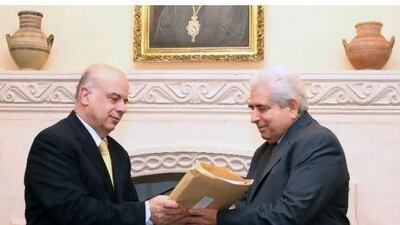NICOSIA // Forthright conclusions of an independent inquiry into Cyprus's worst peacetime military accident ignited renewed calls yesterday for the resignation of the island's beleaguered president, Demetris Christofias.
His "negligence and carelessness" were primarily to blame for the devastating explosion of a large cache of confiscated Syrian-bound, Iranian munitions that killed 13 people in July, a state-appointed investigator said.
Polys Polyviou, a highly respected, British-trained lawyer, told a news conference that Mr Christofias bore a "serious, and very heavy personal responsibility" for the blast at the Evangelos Florakis naval base at Mari on the island's southern coast.
But the Cypriot president last night vehemently denied any personal responsibility and proclaimed that Mr Polyviou - who was appointed by his own government - had exceeded his mandate and failed to provide evidence to support his accusations in a damning 643-page report.
Cyprus reluctantly seized the explosives from a Cypriot-flagged vessel in February 2009 after the United Nations sanctions committee said the consignment contravened a ban on Iranian arms shipments.
Both Tehran and Damascus had pressured the Mediterranean island not to seize the munitions and, once it had, not to destroy them.
Mr Christofias, the European Union's only communist leader, had tried to placate Damascus and Tehran while simultaneously attempting to meet the demands of the United States and other Western powers. It was a risky diplomatic game which left Cyprus with no room to manoeuvre, the inquiry, headed solely by Mr Polyviou, found.
For two-and-a-half years, 98 containers of Iranian gunpowder and nitroglycerine were left exposed to wide temperature swings in an open field just 150 yards from Cyprus's main power station.
The blast crippled the Vassilikos plant - which met more than half the island's electricity needs -- deepened economic woes and fanned speculation that Cyprus would require a bailout from the European Union.
"The report is a first for Cyprus where the big fish are never held responsible," said Hubert Faustmann, a political analyst at the University of Nicosia. "Logically, Christofias should now resign. If he doesn't, he'll be even more of a lame-duck president than he already is."
The spokesman for Cyprus's main opposition Democratic Rally Party, Haris Georgiades, said: "He [Christofias] should resign and assume his responsibilities… or call early elections immediately and ask for a vote of confidence."
Mr Polyviou's conclusions are non-binding and Mr Christofias, who was elected with a five-year mandate in 2008, enjoys immunity from prosecution.
But the Cypriot president, a thin-skinned politician who portrays himself as a man of the people and is not used to being unpopular, will have been dismayed by the investigation's unsparing conclusions.
Mr Polyviou accused him of "unforgivable negligence" for allowing the munitions to be stored out in the open and not taking steps to avert the risks despite repeated warnings.
"It was a time-bomb left at the naval base until it exploded," Mr Polyviou told a news conference that was broadcast live on national television.
"The President of the Republic… failed to take elementary measures for the security of Cyprus's citizens," he said.
Appearing voluntarily before the inquiry last month, Mr Christofias said he was kept in the dark by his own ministers and aides about growing signs that storage of the munitions had become dangerous in the scorching July heat.
"I had told my cabinet … the president felt like a cheated husband, who was the last to know," Mr Christofias said.
But Mr Polyviou insisted he was convinced that the president was aware of the danger posed by the deteriorating arms cache: "Saying 'I don't know' is not enough."
A week before the explosion, some of the containers emitted a hissing sound as the explosives inside heated up.
Among the dead were 20-year-old twin brothers who had been ordered to hose down the metal containers to prevent them from overheating.
Mr Polyviou said that the president's defence and foreign ministers, who resigned after the blast, were also to blame.
Mr Polyviou said the ex-foreign minister, Marcos Kyprianou, put off UN weapons inspectors earlier this year who requested they be allowed to check the "actual state of the cargo".
"Within two minutes they would have realised the cargo was in a bad state," the lawyer said.
An editorial in today's English Cyprus Mail, wondered whether Mr Christofias, who had said he would respect the inquiry's findings, would now resign.
"Although, constitutionally, he cannot be forced to step down, he may eventually realise that the report has made his position untenable."

